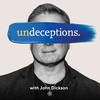

Undeceptions with John Dickson
Undeceptions Ltd
Every week on Undeceptions we’ll explore some aspect of life, faith, history, culture, or ethics that is either much misunderstood or mostly forgotten. With the help of people who know what they’re talking about, we’ll be trying to ‘undeceive ourselves’ and let the truth ‘out’.
Episodes
Mentioned books
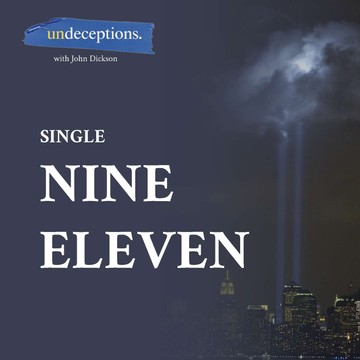
Sep 10, 2021 • 25min
Nine Eleven Single
Today is the 20th anniversary of the 9/11 attacks, a series of coordinated terrorist strikes in the US that killed almost 3000 people and changed the world forever. Our guest for this single, Hans Kunnen, was one of several Australians in New York that day and has told his story many times over the last 20 years. But what struck us about his story was not how close he was to the action, or how he described the flames, the smoke, the hurtling bodies.It is how he talks about the kindness of a stranger - the hope amidst the chaos of what was the most traumatic day of his life.

Sep 6, 2021 • 8min
The Terror Single
On the anniversary of the France's Reign of Terror, John asks where we got the idea that three centuries of the Spanish Inquisition represented the height of human cruelty.In any objective history of human violence it would hardly rate a mention, especially when it stands alongside the terrors of the French Revolution.

7 snips
Aug 15, 2021 • 1h 12min
49. Pro Life
** We’re talking about abortion in this episode, and occasionally we mention sexual abuse and violence. Nothing graphic, we promise. But some listeners may find what follows distressing. Be safe. **We're weighing up the arguments of the Pro Choice and Pro Life movements. Perhaps we can convince you that the case against abortion - the pro-life case - isn’t as dumb and mean as it's often portrayed to be, and nor does it depend on religious dogma.This episode is sponsored by Zondervan's new book The Global Church: The First Eight Centuries by Donald Fairbairn.LINKSRead Judith Jarvis Johnson's groundbreaking article about abortion, where she offered the violinist thought experiment as a way to illustrate bodily autonomy: A Defense of Abortion by Judith Jarvis Thomson, Philosophy and Public Affairs, Vol. 1, No. 1. (Autumn, 1971), pp 47-66. Get to know our guest, Professor Margaret Somerville.Read Somerville's book that first introduced her to John, The Ethical Canary: Science, Society, and the Human SpiritSay hi to our guest, Dr Emma Wood.Here's some more info on Professor Michael Tooley, Emma mentions as we speak with her. He wrote a very influential book called Abortion and Infanticide in the 1980s, where he argues that an entity can't possess a right to life unless it has the capacity to desire its continued existence. Here's the article called 'Reasons why women have induced abortions: a synthesis of findings from 14 countries', published in the journal, Contraception, in 2017.And here are the statistics on numbers of abortions worldwide, from the Guttmacher InstituteHere's some more on Professor Peter Singer's argument in favour of abortion: "When a woman has an abortion, the fetus is alive, and it is undoubtedly human – in the sense that it is a member of the species homo sapiens. It isn't a dog or a chimpanzee ... But mere membership of our species doesn't settle the moral issue of whether it is wrong to end a life. As long as the abortion is carried out at less than 20 weeks of gestation – as almost all abortions are – the brain of the fetus has not developed to the point of making consciousness possible." He goes on: "Admittedly, birth is in some ways an arbitrary place to draw the line at which killing the developing human life ceases to be permissible, and instead becomes murder ... A prematurely born infant may be less developed than a late-term fetus. But the criminal law needs clear dividing lines and, in normal circumstances, birth is the best we have."Here's Don Marquis' article that we spend a lot of time on in the second half of this episode: "Why Abortion is Immoral", in the Journal of Philosophy vol.86, no.4 (April 1989), pages 183-202: "The claim that the primary wrong-making feature of a killing is the loss to the victim of the value of its future has obvious consequences for the ethics of abortion. The future of a standard fetus includes a set of experiences, projects, activities, and such which are identical with the futures of adult human beings and are identical with the futures of young children. Since the reason that is sufficient to explain why it is wrong to kill human beings after the time of birth is a reason that also applies to fetuses, it follows that abortion is prima facie seriously morally wrong."Here's a link to the full New York Times podcast 'The Argument' episode called 'Why the Anti-Abortion Side Will Lose, Even if it Wins' (if you don't have a NYT subscription, just look it up on your podcast app - it was published on April 14, 2021. Watch Paxton Smith's speech from her Texas high school graduation here.Read this article in The Economist called 'Texas's new proposal shows why abortion law is a mess in America', re: the so-called Texan "heartbeat bill". Here's more on the Mississippi case that will come before the Supreme Court and challenge Roe v Wade, from the New York Times.Producer Kaley found this article really interesting while researching this episode: The epic political battle over the legacy of the suffragettes, in The Atlantic which explores why both sides of the abortion debate see themselves as inheritors of the early women's movement. Read the paper by economists Janet L Yellen and George Akerlof called 'An analysis of out-of-wedlock childbearing in the United States', Quarterly Journal of Economics, May 1996, which carried this quote (among lots of other interesting insights): “By making the birth of the child the physical choice of the mother, the sexual revolution has made marriage and child support a social choice of the father.”
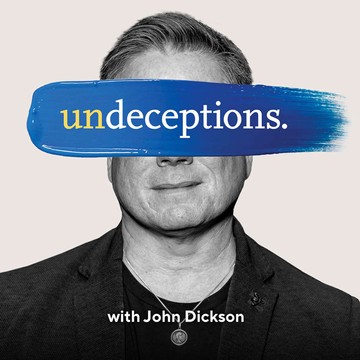
Aug 8, 2021 • 59min
48. Ask Anything IV
It's this season's Q&A episode, where listeners get a chance to ask John Dickson their burning questions. This episode is sponsored by Seven Things I Wish Christians Knew About the Bible by Michael F Bird, a new book published by Zondervan.QUESTIONSIs all “music” at its best good or beautiful and at worst simply neutral; or can some “music” be “bad”, “evil” or “ungodly”? (Check out our two episodes on music from Season 3: Creation's Music and Discordant Religion).Are there dangers in pop music we might steer our children away from for example? Regarding the 7 Deadly Sins: what's their origin and their accuracy in terms of Jesus' teaching and Christian living? If I have a conversation with a person who is sceptical of Christianity about the issue of race, I know they're going to bring up times when God ordered the wiping out of a city or a whole race (like when Israel wiped out the Amalekites in the book of 1 Samuel) as evidence that the Bible is racist. What should I say? (Check out our last episode of Season 3, Racist Church)Why were the Jews God's chosen people? According to a lot of Christian principles (at least the ones I was brought up with) people who were alive before Jesus but didn't know the Hebrew god would go to Hell for not knowing him. So, why did God choose the Jews? Why condemn the people who lived at the same time, but in other parts of the world i.e the Australian Indigenous peoples?A listener comment that we made into a question: I thought that you gave the Black Lives Matter organisation a very soft run in this podcast. It is not anywhere close to a Christ-centred organisation. Their website, until recently, noted that they were seeking to “disrupt the Western-prescribed nuclear family structure requirement” and “foster a queer affirming network” and “do the work to dismantle cisgender privilege”. Did you go too soft on this whole ‘Black Lives Matter’ thing on the Racist Church episode? Andrew says he listened to that version of ‘Little Things’ by Ziggy Ramo and Paul Kelly, which tells the tragic story that Australia’s colonisation starts with the Pope’s ‘Doctrine of Discovery’ in 1493, which Captain Cook later used to claim Australia as ‘Terra Nullius’ - nobody’s land. He says he’s looked into the doctrine of discovery and it’s just terrible. Why did the church make such a decree? What do you think about the idea of machines being “persons.” (Check out our two episodes on artificial intelligence: Artificial Intelligence and Homo Deus)There seems to be a slew of so-called prophets coming out of the woodwork in the USA prophesying all sorts of messages especially about the political scene. What does the Bible say about this?How does one explain the Egyptian culture and the God's that they believed in and the afterlife they believed in? Was there any part of the God that we worship today? Was he the same god then? Could the God of the Jews be the God of other faiths? Could other Faiths be just interpreting the same God in different ways? I've heard stories of other cultures around the world who hadn't been exposed to Christianity having similar principles and creation stories to that of the Bible. Could God have been revealing himself to them?I was listening recently to a podcast 'People I Mostly Admire' hosted by Freakonomics author Steven Levitt interviewing Magician Joshua Jay. They speculate whether Jesus' miracles were simply tricks and they claim tricksters at the time were doing exactly the same thing, obviously inferring Jesus was just kind of a trickster. I have never heard this suggestion before and I wondered if you could fact check it based on your study of Jesus' times. Did the 100 Pages episode mention the talking donkey? How do you tackle weird and wacky thing in the Bible?At the end of the Gospel of Mark, Mark describes how the women went away and said nothing to anyone. But other gospels say they went away and told people. What can we say about this contradiction in the Bible? (Check out our episode Bible Mistakes for more)The podcast often proudly cites non-believing references. I value this approach but is there a weight behind all these people who know scripture so well but don't believe?
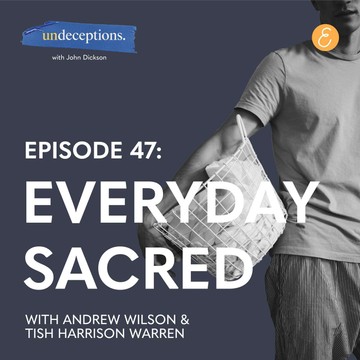
Aug 1, 2021 • 56min
47. Everyday Sacred
Just when you imagine Christians are all so heavenly minded they’re of no earthly use … the Bible itself brings us back to the earth. That’s where the action is. In fact, the final great scene of the Bible doesn’t have us all floating up to heaven. It has heaven coming down to earth. Down … to … earth. There’s a lot in that phrase. As far as religions go, Christianity is arguably the most down-to-earth perspective you could imagine. LINKSWinnie The Pooh loves honey in the books and every movie he's in, but particularly the 2011 version we quoted from. This episode is sponsored by Zondervan's new book, Becoming All Things by Michelle Ami ReyesMeet our guests for this episode:Andrew Wilson, London pastor and author of a new book called God Of All Things: Rediscovering the Sacred in an Everyday WorldTish Harrison Warren, Anglican priest and author of Liturgy of the Ordinary: Sacred Practices in Everyday LifeRead Psalm 19, which begins "The heavens declare the glory of God; the skies proclaim the work of his hands." Read more about CS Lewis' "supposals" ... and check out The Lion, The Witch and the Wardrobe while you're at it. Watch the heartwarming Old People's Home for Four Year Olds. This one's the Australian version. Or, for a similar feeling, watch Ted Lasso on Apple TV. John Dickson called it "the best show since The West Wing" ... and that's high praise!Read more from James K.A. Smith on cultural liturgies.Read more about CS Lewis' conversion to Christianity.More reading, this time on Wendell Berry from the New Yorker.
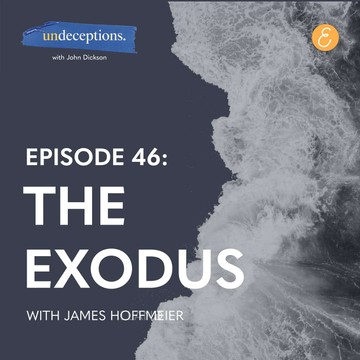
Jul 25, 2021 • 1h 1min
46. The Exodus
The parting of the red sea is legendary today … and most people treat it as just that … legend.Like many things in the Bible, the exodus from Egypt (recorded in the book Old Testament book of Exodus) is looked on with great scepticism by secular scholars - and some Christian scholars even.It’s understandable. The existence of Moses, mighty prophet and prince of Egypt. The ten plagues that devastated that ancient civilisation. The blood of the passover lamb protecting the houses of Israel from the plagues. And, of course, the deliverance of the people of Israel en mass from the slavery in Egypt.They all lack direct historical evidence outside the Bible. So it’s just made up, right? Well, sort of … not really! LINKSThis episode is sponsored by Zondervan Academic's new book ‘God of All Things’ by Andrew Wilson.Meet our guest, James Hoffmeier, Professor of Old Testament and Near Eastern Archaeology at Trinity International University, Divinity School (Deerfield, IL).Check out the new book Five Views on the Exodus: Historicity, Chronology and Theological Implications, which showcases (as it says on the packet) five different views on the Exodus, including Hoffmeier's. Read Rick Watt's "gamechanger" book, Isaiah's New Exodus in Mark (the super expensive, textbook like one!) Connect the dots between The Exodus and the Gospels with John Dickon's A Doubter's Guide to Jesus. LISTENBonus Five Minute Jesus for this episode, listen here.
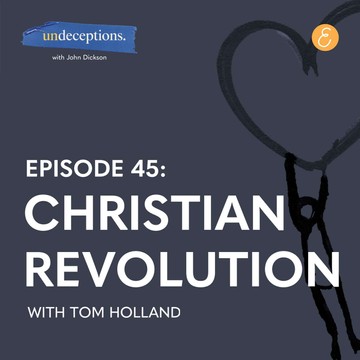
Jul 18, 2021 • 52min
45. Christian Revolution
We all know Christianity thrives on ignorance, sunk us all into the dark ages, and has resisted human rights and equality for most of its 1500 year reign.What have the Christians ever done for us?Our guest today - who says he’s not a believing Christian - reckons many of us have things completely back to front. It’s Christianity, he insists, that gave us many of the secular humanitarian ideals we hold so dear.LINKSThis episode was sponsored by Zondervan's new book Person of Interest: Why Jesus still matters in a world that rejects the Bible by J Warner Wallace Meet our guest, Tom HollandRead Holland's latest book, Dominion: The making of the Western MindOr check out his YouTube channel, where you can watch one of the documentaries he made with the BBC on Islam Here's a 5 minute primer on stoicism from Ted-Ed. Want more? Here's a good place to start to learn more about Stoicism.Watch the trailer for HBO's award-winning series, Rome. Be warned... it's brutal. More on the Pax Romana ("Roman peace") Watch this segment from the Centre For Public Christianity's documentary, For the Love of God, on the origins of western healthcare.Here is Stephen Greenblatt's book The Swerve from 2012, which offers a contrary argument about Christianity's influence on the world. Full disclosure: Tom Holland, while an admirer of Greenblatt's work on Shakespeare, thinks The Swerve is by far his worst book. So ... the Dark Ages? Not so dark. We'll undoubtedly do a whole episode on that soon enough, but in the meantime, John Dickson's new book Bullies and Saints has a bit to say about it too.
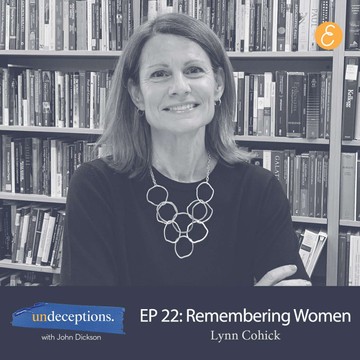
Jul 11, 2021 • 58min
The best of Remembering Women
John Dickson is taking a bit of a break to grieve the passing of his friend, Ben Shaw. So, in the interim, Producer Kaley and Director Mark have decided to choose their favourite Undeceptions episodes to drop into your podcast feed for two weeks. Week number two is brought to you by Director Mark. He has chosen to re-share the Remembering Women episode. John visits Dr. Lynne Cohick to chat about how early Christians valued and celebrated women in the first centuries of the church. Director Mark recommends it because unveils a side of feminine history he'd missed, gets us outdoors again in the middle of an Australian lockdown, and includes a whole gamut of contributions, including Producer Kaley's favourite music.

Jul 4, 2021 • 42min
The best of Old Papers
John Dickson is taking a bit of a break to grieve the passing of his friend, Ben Shaw. So, in the interim, Producer Kaley and Director Mark have decided to choose their favourite Undeceptions episodes to drop into your podcast feed in the next two weeks. Producer Kaley's favourite is the very first episode of Undeceptions, called ‘Old Papers’. It harks back to a time when we were allowed to travel overseas, and John visited the University of Michigan’s Papyrology department to get his hands on some of the earliest manuscripts we have for the New Testament. Producer Kaley reckons it’s what Undeceptions does best: it’s historical, it’s hands-on and it laid the groundwork for what this podcast wants to sound like - friendly and factual, with a little nerdy excitement thrown in.
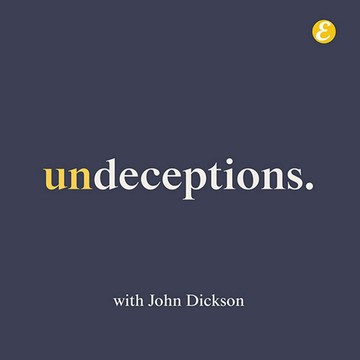
Jun 27, 2021 • 13min
Facing Death Single
Ben Shaw and John Dickson were friends since childhood, became Christians together in their teens, formed a rock and roll band in their 20s, and went on to study theology and minister in the fields God opened up to them.The death of Ben Shaw has provided John with an opportunity to reflect on the sort of book his best friend felt was worth using his last months to write, and the spiritual lessons he has learned from decades of standing beside him.


